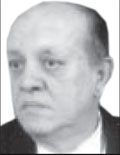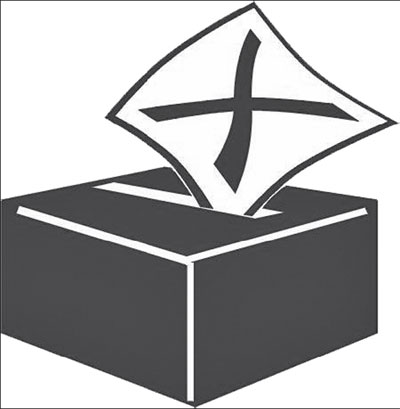The essentials of a free and fair poll
 Lakshman
I.Keerthisinghe -LLB, LLM.MPhil, Attorney-at-Law Lakshman
I.Keerthisinghe -LLB, LLM.MPhil, Attorney-at-Law
The masses are the
material of democracy, but in form – that is to say the laws which
express the general reason, justice and utility-can only be rightly
shaped by wisdom, which is by no means a universal property
- H.F.Amiel - Journal
An election is a formal decision making process by which a population
chooses an individual to hold public office. Since the 17th Century
elections have been the usual mechanism by which modern representative
democracy has operated Elections may fill offices in the Legislature,
sometimes in the Executive and Judiciary, and for regional and local
government. This process is also used in many other private and business
organizations, from clubs to voluntary associations and corporations.
The question of who may vote is a central issue in elections. The
electorate does not generally include the entire population; for
example, many countries prohibit those judged mentally incompetent or
incapacitated from voting, and all jurisdictions require a minimum age
for voting.
The nature of democracy is that elected officials are accountable to
the people, and they must return to the voters at prescribed intervals
to seek their mandate to continue in office. For that reason most
democratic constitutions provide that elections are held at fixed
regular intervals.
Non-governmental entities can interfere with elections, through
physical force, verbal intimidation, or fraud, which can result in
improper casting or counting of votes. Monitoring for and minimizing
electoral fraud is also an ongoing task in countries with strong
traditions of free and fair elections. Problems that prevent an election
from being “free and fair” take various forms:
Lack of open political debate or an informed electorate
The electorate may be poorly informed about issues or candidates due
to lack of freedom of the press, lack of objectivity in the press due to
state or corporate control, or lack of access to news and political
media.
Unfair rules
This can include Gerrymandering, exclusion of opposition candidates
from eligibility for office, and manipulating thresholds for electoral
success are some of the ways the structure of an election can be changed
to favour a specific faction or candidate.
Interference with campaigns
Those in power may arrest or assassinate candidates, suppress or even
criminalize campaigning, close campaign headquarters, harass or beat
campaign workers, or intimidate voters with violence.
Tampering with the election mechanism

This can include confusing or misleading voters about how to vote,
violation of the secret ballot, ballot stuffing, tampering with voting
machines, destruction of legitimately cast ballots, voter suppression,
voter registration fraud, failure to validate voter residency,
fraudulent tabulation of results, and use of physical force or verbal
intimation at polling places.
Equally this list is only some of the ways in which it can occur,
other examples may include persuading candidates into not standing
against them. Some examples include: blackmailing, bribery, intimidation
or physical violence. (Wikepedia)
CommonBorders Web Site
recently commenting on free and fair elections stated thus:
‘A Free electoral process is one where fundamental human rights and
freedoms are recognized including:
* freedom of speech and expression by electors, parties, candidates
and the media;
* freedom of association; that is, freedom to form organizations such
as political parties and NGOs;
* freedom of assembly, to hold political rallies and to campaign;
* freedom of access to and by electors to transmit and receive
political and electoral information messages;
* freedom to register as an elector, a party or a candidate;
* freedom from violence, intimidation or coercion;
* freedom of access to the polls by electors, party agents and
accredited observers;
* freedom to exercise the franchise in secret, and
* freedom to question, challenge and register complaints or
objections without negative repercussions.
A fair electoral process is one where the ‘playing field is
reasonably level and accessible to all electors, parties and candidates
and include:
* an independent, non-partisan electoral organization to administer
the process;
* guaranteed rights and protection through the constitution and
electoral legislation and regulations;
* equitable representation of electors provided through the
legislation; clearly defined universal suffrage and secrecy of the vote;
* equitable and balanced reporting by the media;
* equitable access to financial and material resources for party and
candidate campaigning;
* equitable opportunities for the electorate to receive political and
voter information;
* accessible polling places;
* equitable treatment of electors, candidates and parties by
elections officials, the government, the police, the military and the
judiciary;
* an open and transparent ballot counting process, and
* election process not disrupted by violence, intimidation or
coercion.’
The Inter Parliamentary Union (IPU) has also issued a comprehensive
report on Free and Fair Elections.
In recent times in Sri Lanka there have been many prominent
politicians in the Opposition parties who have been openly advocating
the merits of free and fair elections but unfortunately these are the
very same persons who resort to violence, intimidation and impersonation
to achieve their own ends when elections are held. The question is
whether they are able to practice what they preach.
For instance if one were to imagine a situation at which at a recent
election held to elect office-bearers in a prominent association in Sri
Lanka one of these prominent opposition politicians was conducting the
election as the pro-tem chairman. When persons distributing the lists of
names of some candidates were assaulted in spite of the presence of the
Police the said person refused to take action. In the same manner when
strangers with membership cards of members who are abroad started to
impersonate and the matter was reported no action was taken to prevent
such electoral fraud.
There are persons who act in self interest who fail to act in such
circumstances in view of the perks they could obtain by the victory of
the candidate who uses such fraudulent means to come to office. Finally
the opposing candidate and his team left the premises of the association
in disgust and the stuffing of the ballot boxes commenced immediately
afterwards. When the result was announce it was found that the number of
votes in the ballot boxes far exceeded the number of members registered
as having voted. In spite of the said discrepancy the candidate who
perpetrated the fraud was declared elected with a thumping majority. So
much for free and fair elections chaired by a vociferous champion of
such a noble concept.
As the Northern Provincial Council elections are to be held shortly
it is in the interests of democracy and the rule of law that similar
occurrences such as the above-mentioned malpractices are not permitted
to occur. It is a disgrace to come to power using such degrading tactics
as when people become aware of such instances the politicians who use
such tactics would not earn the respect of the public at large as it has
been often said that one cannot demand respect but with one’s own
exemplary conduct one has to command respect that comes from within the
hearts of human beings.
A fraudster who comes to power even in a voluntary association will
be despised by the members as well as the staff of such associations,
who may remain silent due to the perks they receive or through the fear
of reprisals. As there is a saying that love of money is the root of all
evil such fraudsters are targeting the funds of such associations for
their own comfort.
It is time that all Sri Lankans should learn to realize the value of
free and fair elections as persons who come to power through such noble
means would earn the respect of the people forever. |





